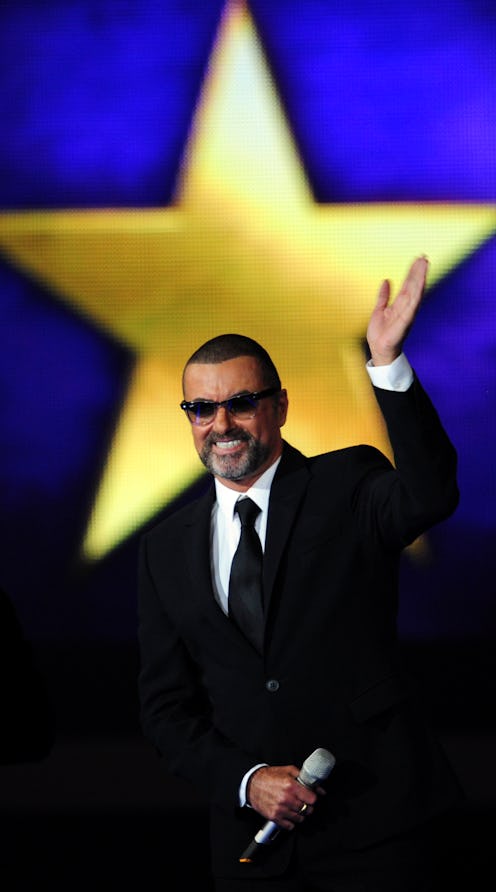Entertainment
This George Michael Interview Is Iconic

As we look back on George Michael's legacy after his shocking death, it's only right that we should take time to appreciate and better understand what he stood for. Michael's 1998 CNN interview on his sexual orientation might be the best starting point because it marks the first time in his career when he publicly discussed his life as a gay man. As we now remember Michael and how he has been defined as a gay icon, this interview is more pivotal than ever.
Michael was honest and frank about his sexual orientation when he was interviewed by CNN Los Angeles correspondent Jim Moret in 1998. Over the course of their discussion, which took place at a time when same-sex marriage wasn't even legal in the United States, Michael was able to illuminate Moret on his struggle with being gay and how he reconciled public and private perceptions of his romantic life.
This interview, which you can watch below, featured Michael discussing how he wrestled with his sexuality and the ways in which public perception had thrust an identity upon him. The fraught nature of celebrity had become a theme in Michael's career at that point: A 1990 L.A. Times profile examined Michael's desire to downplay his celebrity. This profile earned the attention of legendary singer Frank Sinatra, who wrote a letter to Michael via The L.A. Times shortly after the profile's publication. The letter seemed to both scold Michael for scorning fame and attempt to boost his confidence but the incident, in its entirety, may give credence to Michael's statement in the interview about not readily letting the public into his private life.
From the get-go, Michael appeared ready to discuss his sexuality. "Your sexuality has been the focus of tremendous attention in Great Britain," Moret stated. Michael replied, "I think to some degree with pop stars, or film stars, we become the object of people's self-definition as well as the object of sexual definition. I think people like to think they can spot a gay person as opposed to a straight person because it makes them feel something a little bit more defined in themselves." It should be noted that Michael's calmness in the interview is a wonder to behold; even more noteworthy, Moret does not condescend to Michael especially when he does come out in the interview.
Michael's statement on his sexuality, which gives way to him confirming that he is gay, becomes the defining one in the interview:
"My sexuality was not cut and dry. I spent the first half of my career being accused of being gay when I hadn't had anything like a gay relationship. In fact, I was 27 before that happened to me. So I spent years, growing up, being told what my sexuality was, which was kind of confusing. And then, by the time I had kind of worked out what it was and I'd stopped having relationships with women, I was just so indignant at they way I'd been treated I just thought, 'Well, I'll just hold on to this. I don't think they need to know. I don't think I should have to tell them.' But, you know, this is as good a time as any."
Michael went on to state, in no uncertain terms, that he was in a relationship with a man and had not been in a relationship with women for over 10 years (at the time of the interview, that would have meant the late '80s). The singer's complex relationship with sexual orientation, both in public and private spheres, seemed to solidify during that interview. It could be argued his public embrace of his sexuality during that 1998 interview was a truly definitive moment in his career and brought many of his fans even closer to him. The openness and readiness to discuss a topic which at the time was still somewhat taboo, especially for a celebrity who had been coded as heterosexual in the early years of his career, was paradigm-shifting. It was also incredibly moving and empowering.
Michael's career has been defined, in part, but the sexual essence seemingly bursting out of him at every turn. From the early days of Wham! as a pop heartthrob to the sultriness of "Father Figure," Michael was truly an object for the public's affections. That sexiness became entwined with his identity as a gay man and for the latter portion of his career, as The Guardian's Owen Jones stated, he was defined as an iconic gay figure in music. This definition led to us now remembering him as a man who openly rejoiced in his sexuality, was frank about it, was politically active in the LGBTQ community, and who chose not to hide (a progressive move even now, in 2016).
Michael's contribution to music is immeasurable. But the aspects of his non-musical life that remain rooted in his sexual orientation are also a big part of the reason why he was so beloved as a man and a musician, and they begin right here, with this pivotal 1998 interview.